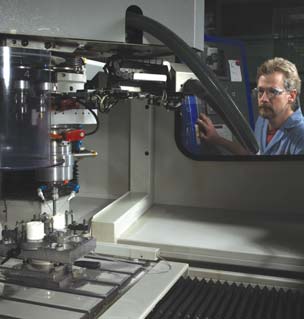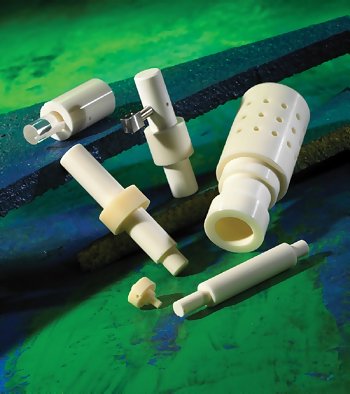Home /
Why Hard Materials Vs. Metals?
Many times we are asked at INSACO if we could machine a thin metal rod, or drill a small metal plate, often requiring extremely tight tolerances and precision cuts. Unfortunately we don’t machine metal or plastic materials. We specialize in hard materials such as sapphire, ceramic, aluminum nitride, boron carbide, silicon nitride, and zirconia, to name just a few.
The reason we specialize in these materials instead of metals is that we feel these hard materials have unique properties and characteristics that many times can REPLACE metal, and often at a more cost efficient or property enhanced benefit.
High Precision Machining is the Key

INSACO is a machine shop specializing in ceramic materials. We don’t make these materials but rather process them into something more valuable through our precision machining capabilities. This allows us to be unbiased when it comes to making recommendations as to what material is best suited for a specific application. With over 85,000 square feet dedicated to the diamond grinding of these hard materials, we have become a global leader in this specialized field.
In numerous applications ferrous materials are the only clear choice, and should be used accordingly. With the advent of exotic hard materials exhibiting superior performance to metallic materials, it’s important to understand that alternatives to metals do exist and should be considered. For example, we recently replaced a ferrous metal roller used in a metal bending application with a ceramic roller. Since these ceramic rollers have yet to be replaced, this has resulted in the elimination of any downtime. Pumping and metering chemically aggressive fluids is another application in which metal parts have been replaced. Using a high-quality starting material, we are capable of achieving a surface finish of less than 4 micro-inches on an inside diameter of a ceramic tube. This surface finish allows for the plastic plunger to last longer than metal, again reducing downtime and costly field service calls. We’ve also used various ceramic materials as stops in lapping applications, allowing for precision thickness lapping and extending wear life compared to more conventional metal stops.

Clear Advantages Over Metal
The use of sapphire, ceramics and other hard materials has significant advantages over metal depending on the application. The materials we machine are harder and stronger in compression than most metals. They can be electrically or thermally insulating or conducting, and in the case of sapphire, can be polished optically clear to a surface finish less than 1 microinch. This allows for selecting material based on the most important material property required and allows for versatility in selecting material which makes the most sense.
Price versus Environment Criteria
In many applications price is the most important determinant. But when a low-cost part must be frequently replaced because of a harsh environment, looking to hard materials may be the key to lowering overall cost. The ability to withstand extreme temperatures, and corrosive environments are just two of a myriad of applications where the replacement of metals with a hard material can mean the difference between success and failure. That’s another area where INSACO excels. Our technical experts and engineers are well versed on what types of hard materials are best suited for specific applications and can help you in deciding if you should consider replacing your machined metal part with a precision machined hard material.

We don’t stop there.

Once the selection is made for a material which can withstand the environment, we continue to try and improve the selection process through our extensive knowledge of the properties inherent in ceramics, sapphire etc. One relatively new consideration in the “parts production” world is development of Additive Manufacturing (or 3-D printing). This offers wonderful opportunities with plastic parts, and ever more frequently for low volume, complex metal parts as well. Researchers are also working on applying these techniques to building from ceramic powders. While potential certainly exists, performance has not yet reached commercial viability. INSACO does not produce materials. We focus our skills and experience exclusively on custom machining and polishing the already fired/hard ceramics into precision parts. Additive Manufacturing includes requirements for both material production as well as finishing. At the present time this 3D printing technology has not evolved to require our machining expertise. However, it is expected that we will be finish machining 3D ceramic printed parts in the future as the technology continues to develop. The potentials of this technique warrant our close monitoring as we are always looking for ways to improve our capabilities and responsiveness to customer needs.
Not sure about hard materials? Give us a call
The next time you have an application that requires precision machining and you think a metal or plastic material is your only option, think again. Then give us a call and let us help you understand how hard materials just might be a better, more cost efficient, more environmentally sound choice.
